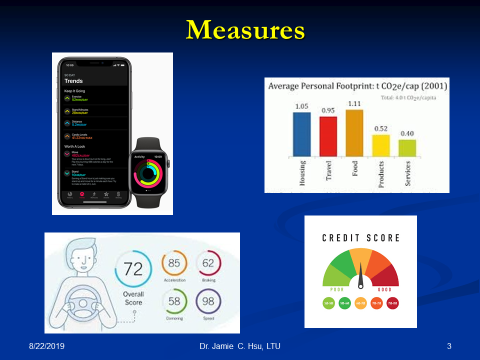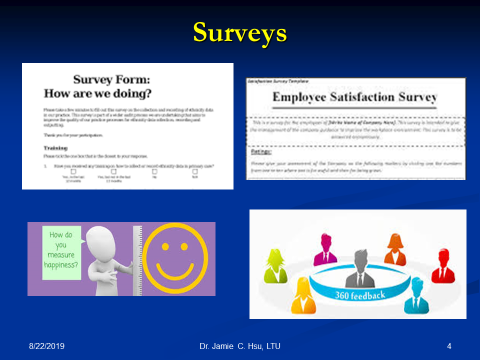
Measures and Surveys Everywhere
– Musings of Dr. Jamie Hsu, 8.25.2019
Do you have the feeling that we are surrounded by measures and surveys? On my Apple Watch, I am constantly told how many steps I have taken, how many minutes of active exercise I have had, and the number of calories I have burned. It also tells me my heart rate and breathing patterns. It constantly gives me encouragement, reminders, and rewards for being active. And when I drive my car, after every trip, the instrument panel will display my driving scores. It rates me on how I start, how I brake, and my best gas mileage. It encourages me to be a safe and economical driver. In addition, we get other measures such as credit scores for our financial transactions, and carbon footprints to measure how friendly we are to the environment.
In addition to measurements, we are also bombarded with surveys. After every interaction with a service person or merchant, I usually receive an email asking for “a few minutes of my time to fill out a simple survey.” Airlines, banks, hotels, cruise ships, stores, and restaurants are all doing this. I often wonder about the consequences of my honest positive or negative feedback. Did someone get in trouble or receive a reward because of my comments?
Even at the workplace, people use various ways to give performance feedback. It could be the 360 degree technique of asking your peers, subordinates, customers, and boss to comment on your work, capability, behavior, and attitude. On the flip side, the company does various work-life surveys to gauge how happy you are as an employee.
With the advent of the digital world, the trend of collecting data and feedback is ever increasing. But I wonder what difference all this effort has made. Are people exercising more, losing more weight, getting healthier, driving more safely, treating customers better, becoming more productive at work, and living a happier life?
The data and information are readily available. But getting the data is only one step in the PDCA (Plan-Do-Check-Act) improvement process. We must digest the data, reflect on it, analyze it, and develop an action plan for improvement. Then, and only then, will the numerous measures and surveys become meaningful and not a waste of time and effort.


處處是 ”評” 量” !
-作者 許俊宸博士
-中譯 薛乃綺
你是否會覺得我們被”衡量”包圍著?就在我自己的Apple手錶上,經常被告知走了幾步路、做了多少分鐘的運動、燃燒了多少卡路里。它同時還告訴我心律以及呼吸模式資訊;它也不斷地給予我積極的鼓勵以及獎勵。而每次我開完車後,車上儀錶板會顯示出我的駕駛評分;評估我如何發动加速、如何刹車、每公里油耗多少。它鼓勵我成為一個安全及節能的駕駛者。除此之外,我們也會獲得其他類型的衡量指標。例如像是對我們金融交易信用的評分、用碳足跡來衡量我們對環境的友好程度等。
除了这些衡量之外,我們也同時被许多的”調查”給轟炸著。每次在跟服務人員或商家互動後,我都會收到email,想要我花幾分鐘的時間來完成簡單的問卷調查。航空公司、銀行、飯店、郵輪、商店和餐館等都會這麼做。我經常在想,究竟我誠實地給了正評或負評的結果會是如何。真的會有人因為我的評論而倒大楣或得到嘉獎嗎?
即使是在工作場合,人們也會用各種方式來對你評估表現。它可能是360度的檢核,要你的同事、下屬、客戶以及老闆來評論你的工作能力、行為以及態度。從另一個層面來做,公司也會進行各種工作生活調查,來衡量你对工作的满意度,是非是一個快樂的員工。
在數位化趨勢之下,收集資料以及調查的方式會变的更容易,會不斷增加。但我想知道這些努力所帶來的差異為何。人們有因此而運動得更多?體重變得更理想?開車開得更安全?對客戶更好?工作效率更高?或是過上更幸福的生活嗎?
數據和訊息隨時都可以得到。但獲取數據只是改善步骤PDCA (Plan計畫、Do執行、Check檢視、Act 動作)的一步而已。我們必須要消化數據、反饋資訊、分析數據,並且制定出改善的行動方案。然後,只有這樣,這麼多的衡量與調查才會變得有意義,而不是浪費時間和精神。


